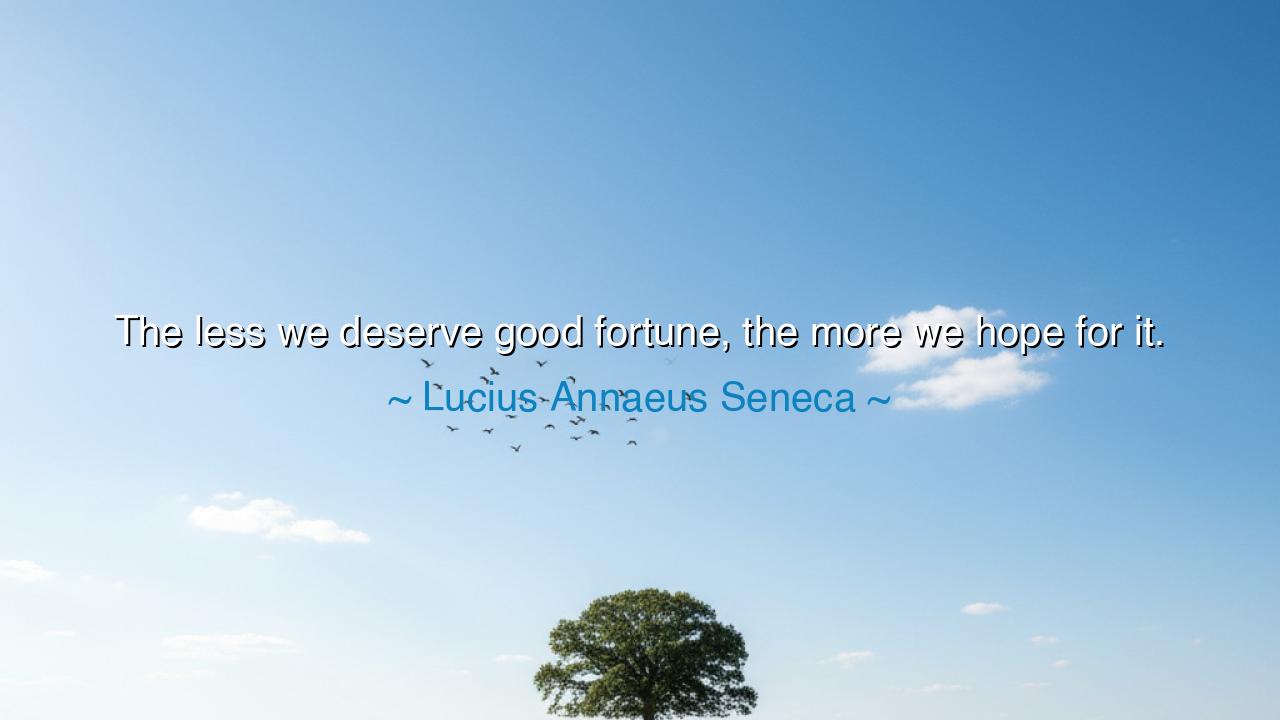
The less we deserve good fortune, the more we hope for it.






“The less we deserve good fortune, the more we hope for it.” Thus wrote Lucius Annaeus Seneca, the Stoic philosopher of Rome, whose wisdom has outlived empires and whose words pierce through the ages like the clear note of a temple bell. In this line, Seneca unveils a truth both uncomfortable and profound — that hope, when unbalanced by virtue, becomes a mirror of our weakness, a longing for blessings we have not earned. It is a gentle rebuke, yet also a call to transformation: to deserve what we desire, rather than merely to wish for it.
Seneca lived in the heart of power, serving as an advisor to Emperor Nero, a man of boundless indulgence and cruelty. From his place within the marble halls of Rome, Seneca watched men cling to wealth, honor, and comfort — all while living lives devoid of discipline or morality. They prayed to the gods for fortune, yet did nothing to earn its favor. And so he observed, with sadness and clarity, that those who least deserved prosperity were often the most desperate for it. For hope, when detached from effort and virtue, is not strength — it is illusion.
This truth reaches far beyond the marble columns of ancient Rome. It speaks to every age, for mankind has always been tempted to ask for what it has not built. We hope for success without toil, for love without kindness, for peace without justice. The farmer who neglects his field still prays for harvest; the student who never studies prays for wisdom; the man who deceives his fellows still hopes for loyalty. In each of these, the same paradox lives: the less we deserve good fortune, the more feverishly we desire it. Hope becomes not a virtue, but an escape — the dream of reward without responsibility.
Yet Seneca, though stern, was not cruel in his wisdom. He did not condemn hope, but sought to purify it. For to the Stoic, true hope is not a wish for the gifts of fate, but a faith in the fruit of one’s own effort. Fortune, he taught, may be fickle, but character is unshakable. The wise man does not sit idle and beg the heavens for favor — he acts, knowing that what comes through effort is his by right, and what comes by chance is but a passing shadow. “Fate,” Seneca wrote elsewhere, “leads the willing and drags the unwilling.” Thus, to be worthy of good fortune is to live so that when opportunity arrives, we meet it already prepared.
Consider the story of Marcus Aurelius, another Stoic and one of Rome’s noblest emperors. In the chaos of plague and war, when all around him prayed for deliverance, Marcus turned not to the gods for rescue, but to reason and duty. He worked tirelessly to restore order, to care for the sick, to govern justly. His fortune was not luck, but the natural reward of discipline, wisdom, and compassion. Where lesser men hoped blindly, he acted rightly. And in this, he found peace — not because the world spared him suffering, but because he had earned the serenity that comes from living well.
Seneca’s teaching warns us, then, of a dangerous habit — the habit of entitlement, born of idleness and self-deception. When a man’s actions are poor, yet his desires are grand, his soul becomes unbalanced. He lives in the tension between who he is and who he wishes to be, and rather than work to bridge that distance, he turns to hope as a substitute for effort. But this hope is hollow; it cannot sustain him. True hope, born of virtue and labor, is a steady flame — but false hope, unearned and unrooted, flickers and dies at the first wind of misfortune.
So, my child, take this wisdom into your heart: do not pray for fortune before you have earned the right to bear it. Seek not the gifts of the gods before you have proven your soul worthy of their trust. Let your actions, not your wishes, speak your worth. Work diligently; act justly; live humbly. Then, when good fortune comes, it will not be a miracle — it will be the natural flowering of a noble life. For Seneca teaches us this eternal truth: fortune favors the deserving, and to deserve is within your power, though fate itself is not.
Therefore, let your hope be not the cry of the idle, but the song of the virtuous. Hope, when joined with effort, becomes faith; when joined with courage, becomes destiny. But hope without virtue is but a shadow of longing. Earn your blessings, and they will endure; chase them without worthiness, and they will fade like mist in the morning sun. For as Seneca knew well, the gods help those who help themselves, and the soul that strives with integrity needs no favor from fortune — for it already carries within itself the richest treasure of all.






AAdministratorAdministrator
Welcome, honored guests. Please leave a comment, we will respond soon